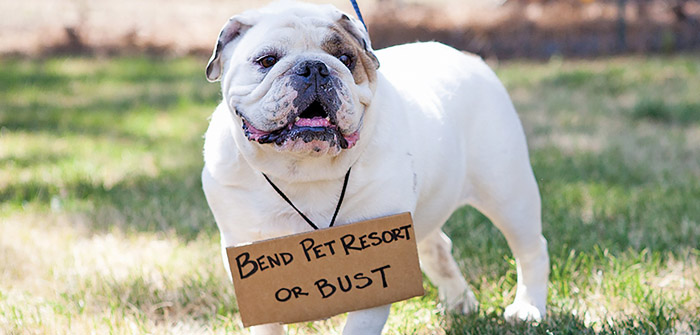(Bend Pet Resort offers boarding, grooming, doggie day care and training | Photo courtesy of Bend Pet Resort)
In the business of pets, industry professionals agree that there are three primary outcomes resulting from the events of the past 15 months: “COVID puppies,” difficulty finding staff and overcoming financial struggles as they work to make up for the weeks or months of closures during 2020.
COVID Puppies and Pet Anxiety
“What we are running into now is what we are calling COVID puppies; they are young dogs under a year to a year and a half in age that have not been properly socialized or trained because they were at home the whole time,” says Ken Granacki, owner of Bend Pet Resort, which offers boarding, grooming, dog day care and training. “A lot of people went out and got pets during the lockdown. I’m also a show dog breeder, and we had ten times the normal inquiries over the past year. Shelters were pretty much wiped out last year.” As people are having to go back to work now, Granacki says he and his staff are having to work through these issues with the young day care dogs who’ve never been separated from their owners before. “They are suffering from separation anxiety because they have to be away from mom now.”
Granacki says he tells clients that what they are doing with their dog is similar to raising a child on a farm in Montana, and then taking the child into the world. “They are unsure and don’t know how to act. They are not leash trained, not socialized and haven’t learned how to play with other dogs.” Doggie day care has been good for these young dogs, he says, because they can play with other dogs in a positive environment. “I’ve been doing this for 30 years, so we get them trained pretty quickly.”
Dr. Scott Shaw, owner and chief veterinarian of Westside Pet Hospital in Bend, says lots of people were home and bored with free time on their hands during the pandemic, so they went out and got pets. “Pets give people somebody to bond with, and it’s a good reason to go outside for a walk. Owners couldn’t be social with people, so they became social with animals,” he says. “Shelters ran out of locally adoptable pets, so they started importing pets from California and Texas, and there is a rescue group that brings them in from South America. As a result, these pets are not socialized very well. Hopefully, the people who adopted them will be patient with them.” He adds, “Adopting a pet is lifelong commitment; don’t rush into it. Make sure you have the time now, and in the future, to handle another being in your family.” Shaw says this wave of unsocialized dogs can present a problem for the veterinarians: “At home, pets can do whatever they want. But when they go to the vet, they have to be restrained a bit and they are not used to it. I was thinking about it, and realized that just because you adopt a puppy, evolutionary-wise, they will still try to get away. They are still wild animals.”
Dr. Shaw says that behavioral challenges in pets due to the pandemic are not isolated to COVID puppies. “We are wondering what kind of anxiety issues we may see in other pets as well as people are going back to work. Pets have been the center of attention, but now kids are back in class and people are going back into the offices. We wonder what kinds of problems we are going to see now.”
Kimberly Rafilson, owner of Muddy Paws Bathhouse in Bend, the largest grooming facility in Central Oregon, says pets provide companionship and a sense of purpose, and that this has been most evident over the past year to 15 months. “They have provided an anchor for many people who feel a loss of control over everything happening externally in the bigger world,” she says. “In terms of behavior, I think it’s a mixed bag. To a degree, a pet’s behavior reflects the owner’s personality; you tend to see anxious dogs with anxious owners and calm dogs with calm owners.” Although dogs who were anxious before are still anxious, Rafilson says that dogs who were calm before may be even calmer now. “Some dogs who were on the cusp of being anxious before are calmer now because their owners have been home. It really depends upon the breed. My own dogs are more chill now because we are around and taking them out more.” Rafilson agrees that in general, the puppies coming in tend to be more anxious than usual because they haven’t been able to get as much socialization. “If there is any group in which we are seeing more anxiety, it would be with puppies, but that seems to be subsiding now as things are calming down,” she says.
Business is Booming, But Staffing is Not
The good news is that with all these adoptions taking place, the pet business is now booming again. Granacki says he had a 50-70 percent reduction in business over the past 15 months, but with people returning to work and traveling again, the need for doggie day care is picking up again, and with another dog day care facility in town now closed, he is seeing the influx. “Now that people are going back to work, they are having to figure out what to do with these new pets. Unfortunately, some are returning them to shelters, but others are trying to find solutions.” The challenge in this, however, is finding staff to help with the increase in business. “We are starting at $15 an hour, and I have only had one person come to apply. In terms of staffing issues going forward, lots of young high schoolers are looking for work now for the summer, but full-time adult employees are hard to find. Everybody in town is hiring, because the government is paying them as much to stay home as to work, so they’d rather stay home.”
Rafilson agrees that business is great, but because of the hiring issues, she has focused on training and promoting from within. “We are seeing that people are bringing dogs in more often. They are home, so they want their dogs clean and smelling nice. But we are having a difficult time keeping up with demand due to a lack of groomers. I employ six groomers, four bathers and five people upfront. Finding qualified groomers has been the biggest challenge of the past year.” To solve the problem, Rafilson says she began conducting inhouse training with staff on how to groom. “We train them on how to be a bather, and then if they want to move on to the next level, we train them on how to groom. We are fortunate: We are a niche business, so I don’t think we’ve been hit as hard as other types of businesses. People who apply here do so because they want to work with pets. My staff do this because they love pets and dogs, they don’t do it to make a lot of money.”
Playing Financial Catch-Up
Rafilson says catching up on the financial end of her business is another hurdle she is facing. “Unemployment insurance has hit us hard because we were closed for eight weeks. Our unemployment insurance rate has gone through the roof. Also, we are dealing with an increase in costs in general on all the supplies we need. Prices have increased, and it takes longer to get everything, so we have to order more supplies and do so in advance so we don’t run out.” The increase in her state unemployment insurance alone was $18,000, she says. “That’s a tremendous amount of money for us.”
Instead of raising prices across the board, Rafilson says she opted to maintain the current price structure, but added an employee benefit fee to help offset costs. “As of June 1, we added a 5 percent employee benefit fee to all of our services. That money will go directly to pay for health and dental insurance for our employees, and paid time off. We are a small business, so every time you raise your prices there are always a lot of questions. But we are being very transparent with our customers. We want them to understand that not only are we providing caring, compassionate service to their pets, we are also taking care of our staff and offering the same benefit package that big box stores offer.” Thankfully, Rafilson says her customers were understanding after she sent out the notice of the benefit fee, and she was pleasantly surprised at the positive response. “It’s been great; we sent out an email about a month ago, and we got 60 responses. Only two were negative. Trying to find a solution to this has been hard; this is not a high profit-margin business. Being able to offer a full benefit package and maintain a living wage for my staff is huge.”
During the mandated closures, Rafilson also made changes to the Muddly Paws facility to help improve the work environment. “We are now providing a better and healthier environment for both our dogs and our staff. We added a couple of quiet rooms for our anxious and/or senior dogs, and we can now work with more aggressive dogs alone in their own space. That’s been a huge benefit that we have now that we didn’t in the past. And we have separated our staff, so they have more working room; it’s quieter and cleaner. The noise level has been greatly reduced.”
Dr. Shaw says that his business is also going strong, although as a medical facility, Westside Pet Hospital is still under the direction of the Oregon Veterinary Medical Association. “For vets, we are supposed to be curbside. We are not supposed to allow clients into the building, so that has hurt communication,” he says. “When something is wrong with a pet, the pet can’t talk to us, so we have to make extra effort to communicate with the client before, during and after the exam. This has added another step and a time lag.” He says a lot of people get upset because they can’t talk to their pet’s doctor. “A person gets to go in and see their own doctor, but can’t go in and see their pet’s doctor. We are still under that added layer of regulation.” He adds, “Like everyone, we just want to get back to normal.”
Granacki says his goal moving forward with Bend Pet Resort is to keep the business growing and to serve the community by helping people with their dogs. “I think it’s going to be a busy summer season; people are wanting to get out of the house and take that long-overdue vacation.” He adds, “Bend is Dog Town USA, so we want to make sure that when people are out in public with their dogs, the dogs behave appropriately as canine citizens.”





